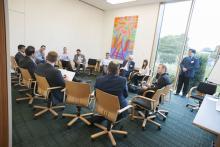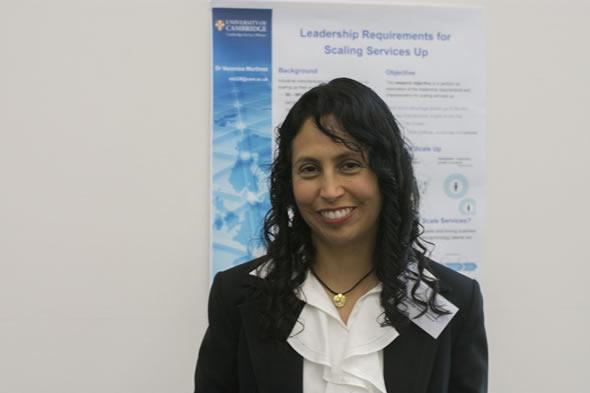
Service Week 2016
Cambridge Service Week 2016 was held from 5-12 October 2016. It was a series of events hosted by the Cambridge Service Alliance to bring together leading academics, industrialists and policy-makers to address the evolving challenges facing service education, research, practice and policy. Details for individual events are below.
- Academic Conference - 5-6 October 2016
- Industry Day Conference - 11 October 2016
- Partners Day - 12 October 2016
Industry Conference - Tuesday 11 October 2016
Growing your service business in an age of digital disruption.
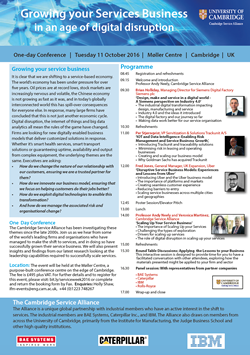 This year our Industry conference focused on 'Growing your service business in an age of digital disruption'. It was held during Cambridge Service Week 2016, on Tuesday 11 October 2016, Moller Centre, Cambridge, UK.
This year our Industry conference focused on 'Growing your service business in an age of digital disruption'. It was held during Cambridge Service Week 2016, on Tuesday 11 October 2016, Moller Centre, Cambridge, UK.
Digital disruption, the internet of things and big data analytics all mean the rules of the game have changed. Firms are looking for new digitally enabled business models that deliver customised solutions in response. Whether its smart health services, smart transport solutions or guaranteeing uptime, availability and output from complex equipment, the underlying themes are the same.
Find out what our keynote speakers spoke about below - with copies of their presentations, as well as Podcast Interviews given during the day.
Speakers
|
|
|
|
****************
Round Table Discussions: Applying the Lessons to your Business
During breakout sessions at the industry day conference, the delegates discussed the learnings of the day and how they can be applied in their own company. Delegates valued the insights provided by other companies about how they run and transform their service offerings, along with insights from a top academic research centre. Delegates also reported valuing learning about novel business models and the many different technologies that were mentioned during the day, including impressive uses of sensor technologies.
When it comes to service operations and design there are many challenges and unanswered questions. Dr Veronica Martinez addressed one of the key questions about defining leadership, and how to scale up services, as well as the challenges associated with it. This touches on the subject of how to disrupt your  own business model, by changing the value proposition - not only once, but by repeating the process constantly. It is expected that data impacts services greatly, so this requires a digital and cultural transformation to accommodate and reflect this. At the same time organisations are internally changing, and also using the wider business ecosystem to change the value proposition. In this context, a new challenge arising is the thought of gamifying the user experience.
own business model, by changing the value proposition - not only once, but by repeating the process constantly. It is expected that data impacts services greatly, so this requires a digital and cultural transformation to accommodate and reflect this. At the same time organisations are internally changing, and also using the wider business ecosystem to change the value proposition. In this context, a new challenge arising is the thought of gamifying the user experience.
Data
Is Data the new Oil? What real value will data bring to our companies? Data is now readily available. However, deriving intelligent properties from the data is challenging for most organisations. It is meaningless to have data available without its analysis leading to business actions, which ultimately create value for the company and its stakeholders.
To do so, new education and leadership culture is needed. An era of digital transformation requires different business skills than were needed a decade ago, which applies to all levels in an  organisation. Data needs to be understood and be used in order to sustain a competitive advantage of the company. Exemplified by Uber and Trackunit the companies showcased how data can be used to help organisations to understand and further develop their competitive advantage in the market.
organisation. Data needs to be understood and be used in order to sustain a competitive advantage of the company. Exemplified by Uber and Trackunit the companies showcased how data can be used to help organisations to understand and further develop their competitive advantage in the market.
With regard to assets, and the data derived from sensors, we can now consider that we are effectively entering an age where we can define that a service failure is due to a lack of data integration. Many companies are turning ‘digital’, and towards the Internet of Things, in order to achieve a seamless information flow from their assets and to integrate services offerings and business models.
The question arose about whether or not data can be seen as the key enabler to service transitions. Creating value propositions, based on the evidence that data can provide, may create benefits for all involved in the service delivery. The biggest barrier for the use of data is associated with data ownership. It was suggested that data ownership discussions should focus more on the benefits of sharing data and the humanisation of data (e.g. detecting trends). Nonetheless, from a law and protection point of view the question remains, ‘what happens to ownership of data?’
Developing new value proposition
The description used by a manufacturing company investing in services is: ‘investing money is being in the service market, having a product is the foot in the door of the customer!’ However, when developing novel and strategic services offerings, the expectations for financial returns are high. For managers, it is complex to define benefits upfront, as well as defining if the service value proposition is a success from the outset. Hence, a different approach is needed within 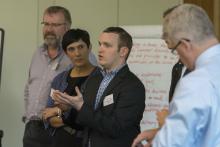 organisations to develop new value propositions. There were questions raised about ‘how do we define benefits upfront?’ and, ‘how do we define the organisation that is enabled to do so?’. Examples in discussion were about ‘which direction to take as an organisation?’, and ‘What is the relationship between availability of services, e.g. spare parts and assets and cost?’. Organisations would like to develop availability cheaply, but need to know what it is and how to define it legally, as well as how to organise it strategically.
organisations to develop new value propositions. There were questions raised about ‘how do we define benefits upfront?’ and, ‘how do we define the organisation that is enabled to do so?’. Examples in discussion were about ‘which direction to take as an organisation?’, and ‘What is the relationship between availability of services, e.g. spare parts and assets and cost?’. Organisations would like to develop availability cheaply, but need to know what it is and how to define it legally, as well as how to organise it strategically.
Another interesting discussion point was around how to improve the current value proposition. The example discussed was how Uber not only constantly disrupts itself, but also other traditional market models. The implications of this do not often get discussed. A wider question posed was ‘how should we deal with the people we are disrupting?’, and hence, ‘how should we retain wealth in the society, as well as with the people and workforce?’
Business model innovation
Businesses like Tesla and Netflix do not worry as much about intellectual property, which allows them to innovate faster. They focus on the business model and the speed of innovation. More traditional firms view innovation with their existing business in mind, as well targets / KPI’s etc. It was observed that for many traditional businesses it is easier to just offer products. This can be the case even where competitive issues drive firms down the services path and they need to increase value based on market expectations.
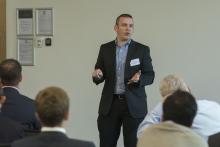 The question that remains to be answered, is ‘how we market new services that are interrupting the businesses?’. For example, ‘how do we own and market a self-driving car, when the experience of driving is taken out of the equation?’
The question that remains to be answered, is ‘how we market new services that are interrupting the businesses?’. For example, ‘how do we own and market a self-driving car, when the experience of driving is taken out of the equation?’
In the same way as with business models, we need to work closer with the customers to address their needs better and reconsider the organisations' offerings. This includes defining and trying different types of co-creation, and building strong B2B relationships, allowing delivery of a better service.
Understanding your business ecosystem
There was an acknowledgement that, in the new world of services, the relationship with people is key to new business. This does not only mean to customers, but also to partners and suppliers. It means, using the ecosystem to innovate and to join and  orchestrate what people do. One example referred to Uber including the driver of the car and his needs in the service process definition. Rightly so, as the driver has a central role in their business model. So the design of services needs to consider all stakeholders not only through their lifetime, but also in the product design phase. For example, ‘how do you get diesel on and off a ship when it is needed during its lifetime?’, ‘who is filling the tanks?’ etc. Extending this, there is a part of understanding the company and customer culture as well. So, one of the challenges seen was to understand how to capture changes in configuration from customers to reflect value proposition and process.
orchestrate what people do. One example referred to Uber including the driver of the car and his needs in the service process definition. Rightly so, as the driver has a central role in their business model. So the design of services needs to consider all stakeholders not only through their lifetime, but also in the product design phase. For example, ‘how do you get diesel on and off a ship when it is needed during its lifetime?’, ‘who is filling the tanks?’ etc. Extending this, there is a part of understanding the company and customer culture as well. So, one of the challenges seen was to understand how to capture changes in configuration from customers to reflect value proposition and process.
Company internal challenges
Within the internal structures of companies one of the biggest challenges seen is that most organisations do not have a try and fail culture, which was seen as necessary for the successful development of a service. There is the a need for leadership that helps the organisation transform, sets the vision, and leads the team. The answer to this may be to have a transformational director or executive that delivers on a set service strategy, and can work against any cultural challenges. This feeds from a team that is enthusiastic about service delivery and has a service mindset.
One area that was discussed, was that of how to deal with investors of companies. Specifically, how to communicate to them about progress and process, as well as on the potential cannibalisation of the product business, due to an increase in the service business. Traditional companies, like Siemens, experience more difficulties to  replicate and to scale up. Whereas, for start-up companies, like Uber, this is easier as they are more flexible and more 'digital'. Traditional companies are more complex and rigid than Uber. Joint venture arrangements may be one solution. Often, though, the main challenge is how to change the mindsets of people. They have different employees and different customers with different acceptance of digital business and digital offerings. For customers, it is important to demonstrate the business case, and demonstrate the success. For employees, it is important to change the engineering mindset and to find out about the methodology, e.g. try and fail, designed thinking, customer based thinking, etc.
replicate and to scale up. Whereas, for start-up companies, like Uber, this is easier as they are more flexible and more 'digital'. Traditional companies are more complex and rigid than Uber. Joint venture arrangements may be one solution. Often, though, the main challenge is how to change the mindsets of people. They have different employees and different customers with different acceptance of digital business and digital offerings. For customers, it is important to demonstrate the business case, and demonstrate the success. For employees, it is important to change the engineering mindset and to find out about the methodology, e.g. try and fail, designed thinking, customer based thinking, etc.
Risk
Risk is seen differently in service organisations than it is in product firms. An interesting observation from the groups, was that a product firm has a lot more upfront costs when new products are being developed, and hence more risk than service firms. However, when it comes to services, product firms seem to be less inclined to invest and take on risk. At the same time, there are not many facts around companies that have grown services faster in recent years and it is unclear what they have done differently in order to succeed. Participants also felt that when it comes to taking on risk, people 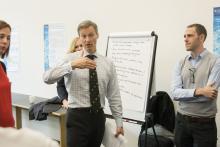 seem to do things 'the old way' versus 'the new way' in service businesses. This is problematic; as without taking risks, it is difficult to develop services, and without failure it is difficult to succeed. To this end, instead of not being allowed to fail we should have more tolerance of failure. During the discussions there was also a general view that big companies handle risks, decisions, treat failure, differently than in smaller companies. For example, in a start-up company a new process would not be seen as 'breaking the rules' or taking risks, as they are just starting up. In older organisations this can be seen as very different. Everything seems to be connected and interlinked. So one good question is, ‘how can you train the leadership to handle the risk?’.
seem to do things 'the old way' versus 'the new way' in service businesses. This is problematic; as without taking risks, it is difficult to develop services, and without failure it is difficult to succeed. To this end, instead of not being allowed to fail we should have more tolerance of failure. During the discussions there was also a general view that big companies handle risks, decisions, treat failure, differently than in smaller companies. For example, in a start-up company a new process would not be seen as 'breaking the rules' or taking risks, as they are just starting up. In older organisations this can be seen as very different. Everything seems to be connected and interlinked. So one good question is, ‘how can you train the leadership to handle the risk?’.
Gamification of services
One newer theme of discussion was the topic of gamification of assets and their use. For example, building a competition out of operating diggers and machinery within the quarry in the most effective way. Operators make it a game to be good at efficient use or if gamification goes wrong, make it a game to be bad. The incentivisation used by some of the company was that people can work towards a CV or better job postings if they are good. There are always more popular sites to work than others, for example, with less commuting time or not to go to the smelly landfill site for work when operating machinery. Organisations can use gamification as a means of monitoring performance in equipment, and improve the quality of the handling, if applied successfully. However, the question remains as to how you transfer this into other industries, or is this a success in other industries. Can you use gamification in Industry 4.0 / smart factories?
Overall the ‘Cambridge Service Alliance – Industry Day’ was well received and delegates took away learnings and actions for their next day in their organisation.
Partners Day - Wednesday 12 October 2016
New Insights from the Cambridge Service Alliance
An executive workshop with the Cambridge Service Alliance. This executive workshop provided new insights and practical tools for those concerned with developing innovative solutions and delivering them through ecosystems. The workshop drew on research completed by members of the Cambridge Service Alliance, who presented exploitable tools and techniques that attendees can use in their businesses.
Academic Conference - 5 - 6 October 2016
 On the 5-6 October, the Cambridge Service Alliance hosted an academic conference with key academic experts from around the world. The theme was 'Services in an Age of Digital Disruption'. Click here, or on the image, to view the abstracts presented during the two day event.
On the 5-6 October, the Cambridge Service Alliance hosted an academic conference with key academic experts from around the world. The theme was 'Services in an Age of Digital Disruption'. Click here, or on the image, to view the abstracts presented during the two day event.

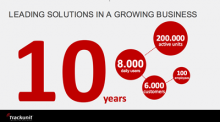

 Director and global developer of services and solutions. Teacher and researcher at Copenhagen Business School he has lately joined the Goldman Sachs owned company Trackunit A/S in Denmark as VP Servitization & Solutions. Per Stjernqvist holds board positions in large service and solution companies.
Director and global developer of services and solutions. Teacher and researcher at Copenhagen Business School he has lately joined the Goldman Sachs owned company Trackunit A/S in Denmark as VP Servitization & Solutions. Per Stjernqvist holds board positions in large service and solution companies. 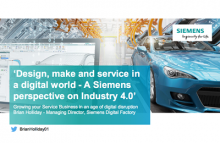 Brian Holliday
Brian Holliday manufacturing. He is also a main board member for the EEF, the Manufacturers’ Organisation which provides vital business support, training and governmental representation for the sector. A Chartered Engineer and Fellow of the Institution of Engineering and Technology. Brian started his career as an apprentice with Texas Instruments. He read Computer Systems at Cardiff University before joining Siemens, the global leader in electrification, automation and digitalization in 1993. He attained his Executive MBA at Manchester Business School in 2000 and in 2014 became a graduate of the CBI’s Leadership Programme.
manufacturing. He is also a main board member for the EEF, the Manufacturers’ Organisation which provides vital business support, training and governmental representation for the sector. A Chartered Engineer and Fellow of the Institution of Engineering and Technology. Brian started his career as an apprentice with Texas Instruments. He read Computer Systems at Cardiff University before joining Siemens, the global leader in electrification, automation and digitalization in 1993. He attained his Executive MBA at Manchester Business School in 2000 and in 2014 became a graduate of the CBI’s Leadership Programme.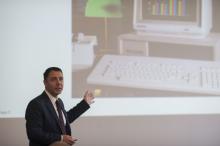
 management sense and by painting a rich and complex picture of the device you are able to view it and bring it to life. You can isolate its characteristics and think about the materials or the suppliers, or you might test it in ways virtually that simply wouldn’t have been possible with earlier methods. You can virtually prototype your products so you can get much closer to having a near to market product designed and built from those virtual models. The digital twin concept is also valid when you take it into the plant. As manufacturers, we have to think about the best way to lay out the factory, and we will need to look at a number of scenarios, but now we can digitise the factory and the data into the model and run these before committing to changes. The digital twin concept is exciting, whether it is the product, the factory or the service you are offering. For design, make and service the digital twin is genuinely exciting.”
management sense and by painting a rich and complex picture of the device you are able to view it and bring it to life. You can isolate its characteristics and think about the materials or the suppliers, or you might test it in ways virtually that simply wouldn’t have been possible with earlier methods. You can virtually prototype your products so you can get much closer to having a near to market product designed and built from those virtual models. The digital twin concept is also valid when you take it into the plant. As manufacturers, we have to think about the best way to lay out the factory, and we will need to look at a number of scenarios, but now we can digitise the factory and the data into the model and run these before committing to changes. The digital twin concept is exciting, whether it is the product, the factory or the service you are offering. For design, make and service the digital twin is genuinely exciting.” “I think there are a number of models where we can take technology, look at what the customer is doing, and wrap it up as a service that means we can make progress. It is because we have a reasonable understanding of what the technology can do in an industrial application for them. The CSA Seven Critical Success Factors, have been helpful to us because they have been derived from industrial experience and I can see that they are up to date in their thinking. The CSA has considered a number of the practical challenges that you would have encountered in servitising your business, and for companies like ours, which largely have a product they wish to sell but increasingly needing to differentiate themselves through service, what the CSFs highlight is that you have to think about assessing your market and your internal readiness and creating the right culture and structures. Then you have to ensure you have the resources to do it. These are all key if you want to avoid the bumps in the road ahead.”
“I think there are a number of models where we can take technology, look at what the customer is doing, and wrap it up as a service that means we can make progress. It is because we have a reasonable understanding of what the technology can do in an industrial application for them. The CSA Seven Critical Success Factors, have been helpful to us because they have been derived from industrial experience and I can see that they are up to date in their thinking. The CSA has considered a number of the practical challenges that you would have encountered in servitising your business, and for companies like ours, which largely have a product they wish to sell but increasingly needing to differentiate themselves through service, what the CSFs highlight is that you have to think about assessing your market and your internal readiness and creating the right culture and structures. Then you have to ensure you have the resources to do it. These are all key if you want to avoid the bumps in the road ahead.” Fred Jones
Fred Jones ups and social enterprises. He provides hands-on support to Founders helping them to develop high-growth business models, executable strategies and compelling business plans as part of Seed, Angel and Series A funding rounds. Outside of work, Fred has been a guest lecturer at the University of Bath, School of Management.
ups and social enterprises. He provides hands-on support to Founders helping them to develop high-growth business models, executable strategies and compelling business plans as part of Seed, Angel and Series A funding rounds. Outside of work, Fred has been a guest lecturer at the University of Bath, School of Management.
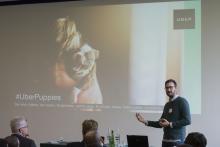 Uber much more broadly. We often have a bit of fun, and one of our stunts is UberIceCream. Because we are a market place we work really hard on keeping our partner drivers efficient, so the busier they are the more they can make and it makes the service more affordable to lots of riders, and the more affordable it is the more people will use it and the busier our drivers will be. It is an advantage to both the customers and the partner drivers.
Uber much more broadly. We often have a bit of fun, and one of our stunts is UberIceCream. Because we are a market place we work really hard on keeping our partner drivers efficient, so the busier they are the more they can make and it makes the service more affordable to lots of riders, and the more affordable it is the more people will use it and the busier our drivers will be. It is an advantage to both the customers and the partner drivers. 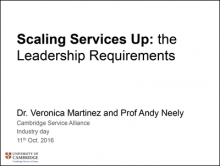
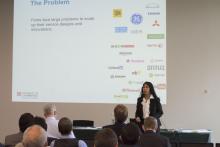 Services project. Her major research expertise revolves around the fields of strategy and service performance, value creation, performance measurement systems and operations management.
Services project. Her major research expertise revolves around the fields of strategy and service performance, value creation, performance measurement systems and operations management. 
